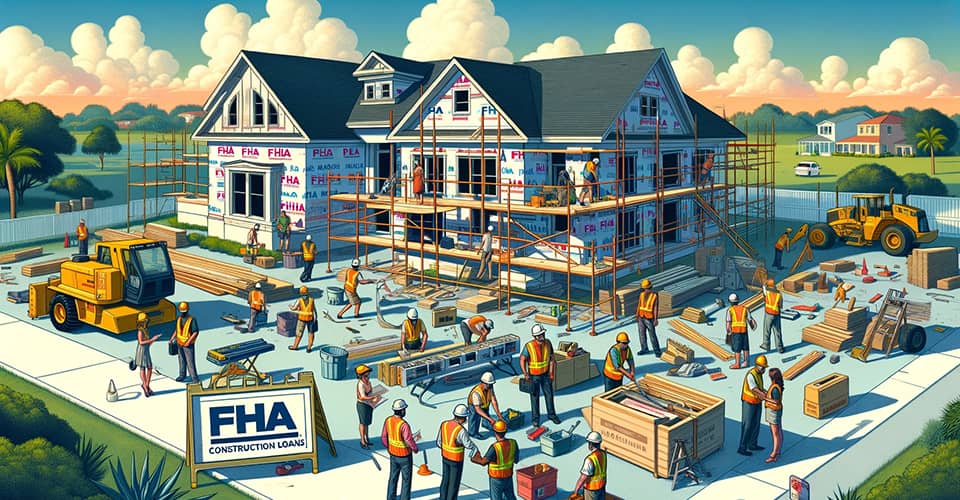FHA Construction Loans in Florida | Requirements and Eligibility
FHA Construction Loans are the perfect loan for many prospective homeowners and builders, offering a blend of flexibility and accessibility that traditional loans may not provide.
This comprehensive guide is designed to illuminate the path to obtaining an FHA Construction Loan in the Sunshine State, a region known for its vibrant real estate market and unique building opportunities.
Whether you're dreaming of constructing your custom home from the ground up or considering substantial renovations to an existing property, understanding the intricacies of FHA Construction Loans is crucial.
What is an FHA Construction Loan?
An FHA Construction Loan is a type of government-backed mortgage that provides individuals with the unique opportunity to finance both the purchase of a land plot and the construction of a new home on it or the renovation of an existing property, all under a single loan and set of terms.
This loan is distinct from traditional mortgages and is specifically designed to cater to those looking to build or substantially renovate their homes.
What sets the FHA Construction Loan apart is its affiliation with the Federal Housing Administration (FHA). The FHA, a part of the U.S. Department of Housing and Urban Development, insures these loans, making them more accessible for a broader range of borrowers, including those with lower credit scores or smaller down payments.
This insurance reduces the risk for lenders, allowing them to offer terms that might be more favorable than conventional loans.
The flexibility of the FHA Construction Loan is one of its most appealing aspects. It allows borrowers in Florida to combine the costs of land, construction, and a mortgage into one manageable loan.
This can simplify the financing process significantly, eliminating the need for multiple loans and fees for each phase of the home-building process.
Moreover, FHA Construction Loans often benefit from lower down payments and more lenient credit requirements compared to conventional construction loans. This opens the door for many first-time homebuyers and those who might not qualify for traditional financing options.
In the following sections, we'll explore the specific requirements, application process, and unique aspects of FHA Construction Loans in Florida, providing you with a comprehensive understanding of how these loans work and how they can help you achieve your dream of building or renovating a home in the Sunshine State.

Eligibility Criteria for FHA Construction Loans
Securing an FHA Construction Loan in Florida requires meeting specific eligibility criteria set by the Federal Housing Administration.
Understanding these requirements is essential for prospective borrowers to assess their chances of approval and prepare adequately for the application process.
Here, we break down the key eligibility criteria for FHA Construction Loans:
-
Credit Score Requirements - The minimum credit score requirement for an FHA Construction Loan is typically lower than that for conventional loans. Generally, a credit score of 580 or higher is recommended. However, applicants with lower scores might still be considered, albeit potentially with higher down payment requirements.
-
Down Payment - FHA Construction Loans are known for their relatively low down payment requirements. Borrowers with a credit score of 580 or higher can expect down payments as low as 3.5% of the total loan amount. Those with lower credit scores may need to provide a larger down payment.
-
Debt-to-Income Ratio (DTI) - Your DTI ratio, which compares your monthly debt obligations to your gross monthly income, is a critical factor in loan approval. A DTI ratio of 43% is typically the maximum allowed for FHA loans, although there can be exceptions for ratios up to 50% under certain circumstances.
-
Primary Residence Requirement - The FHA Construction Loan is intended for primary residences only. This means that the property you plan to build or renovate must be your main place of residence, not a second home or investment property.
-
FHA-Approved Builder Involvement - The construction project must involve a builder approved by the FHA. This ensures the construction will be completed to specific standards and within a set timeframe.
-
Property Approval - The land on which the home will be built, or the existing home to be renovated, must meet certain FHA guidelines. This includes location, zoning, and adherence to local building codes.
-
Loan Limits - FHA Construction Loans have maximum loan limits that vary by location. These limits can differ in Florida depending on the county and the property size.
- Mortgage Insurance - Borrowers must pay for mortgage insurance, including an upfront and annual premium. This insurance protects the lender in case of default on the loan.
By meeting these criteria, borrowers in Florida can take advantage of the benefits offered by FHA Construction Loans. It's important to gather all necessary documentation and work closely with a lender experienced in FHA loans to ensure a smooth application and approval process.
The next section will delve into the required documentation for applying for an FHA Construction Loan, helping you prepare for the next steps in your journey toward building or renovating your dream home.
Required Documentation for Florida FHA Construction Loans
When applying for an FHA Construction Loan in Florida, thorough preparation and organization of necessary documentation is crucial. This documentation establishes your eligibility and ensures a smoother, more efficient loan approval process.
Here's a comprehensive list of the essential documents and information you'll need:
-
Proof of Identity and Legal Residency - Standard forms of identification, such as a driver's license or passport, are required. Additionally, proof of legal residency in the United States is necessary.
-
Credit History - Your lender will need to review your credit report. This report provides insight into your creditworthiness and financial responsibility. Ensure you have a clear understanding of your credit status before applying.
-
Income Verification - You must provide proof of a stable and reliable income. This usually involves submitting recent pay stubs, W-2 forms, or tax returns for the past two years. Self-employed individuals must provide additional documentation, such as profit and loss statements.
-
Bank Statements - Recent bank statements are required to demonstrate your financial stability and ability to manage the down payment and other associated costs.
-
Debt Documentation - Disclosure of all current debts, including credit cards, student loans, car loans, and other outstanding obligations, is necessary to calculate your debt-to-income ratio.
-
Property Details - For new constructions, you'll need to provide details about the plot of land, including the purchase agreement. Details and the current deed of the existing property are required for renovations.
-
Construction Plan and Costs - A detailed construction plan, including blueprints, a timeline, and a comprehensive budget, is essential. The plan must be prepared and approved by an FHA-approved builder or architect.
-
Builder’s Information - Documentation verifying the credentials and FHA approval status of the builder or contractor overseeing the project. This often includes the builder’s license, insurance, and a history of past construction projects.
-
Appraisal - An appraisal of the planned construction or renovation is typically required to ensure the project's value aligns with the loan amount.
- Mortgage Insurance Premium (MIP) Documentation - Proof of payment for the required upfront mortgage insurance premium.
Collecting and organizing these documents in advance can significantly expedite the loan application process.
It’s advisable to work closely with your lender and possibly a financial advisor to ensure that your documentation is complete and accurately reflects your financial situation.
The Benefits of FHA Construction Loans
FHA Construction Loans come with unique advantages, making them an attractive option for many homebuyers and builders in Florida.
One of the most significant benefits is the convenience they offer. Combining the costs of land purchase, construction, and mortgage into a single loan simplifies the financing process, eliminating the need for multiple separate loans and sets of fees.
Another key advantage of FHA Construction Loans is their accessibility. They are particularly favorable for borrowers with lower credit scores or those with a smaller down payment.
The Federal Housing Administration's backing of these loans means lenders can offer more lenient credit requirements and lower down payment options than conventional loans.
This opens doors for a wider range of borrowers, including first-time homebuyers and those who might not qualify for traditional financing options.
The flexibility of FHA Construction Loans also stands out. Borrowers can include various costs in the loan amount, such as land purchase, construction, and even certain closing costs.
This holistic approach to financing makes it easier for borrowers to manage their budgets and plan their finances effectively.
Moreover, these loans are tailored to ensure the quality and timeliness of construction projects. The involvement of FHA-approved builders or contractors is a requirement that guarantees professional oversight and adherence to certain standards.
This not only ensures the quality of the build but also provides peace of mind to the borrower, knowing that their future home is in capable hands.
Additionally, FHA Construction Loans offer stability and predictability. With fixed interest rates, borrowers clearly understand their financial commitments throughout the loan term.
This predictability is crucial for long-term budgeting and financial planning, especially in a project as significant as home construction or renovation.
Finally, the potential for lower interest rates compared to other loan types is a financial benefit that cannot be overlooked. Lower rates mean reduced overall loan costs, making the dream of building or renovating a home more financially attainable for many Floridians.
Steps to Apply for an FHA Construction Loan in Florida
Applying for an FHA Construction Loan in Florida involves a series of steps that require careful attention and thorough preparation.
Here is a step-by-step guide to help you navigate the application process:
-
Research FHA-Approved Lenders - Not all lenders offer FHA Construction Loans, so it's important to find lenders specializing in this type of loan in Florida. Research and compare lenders like MakeFloridaYourHome to find one with favorable terms and a good reputation.
-
Get Pre-Approved - Contact your chosen lender to get pre-approved. This step will give you a clear idea of the loan amount you may qualify for and demonstrate your seriousness to builders and sellers.
-
Find an FHA-Approved Builder or Contractor - Since FHA Construction Loans require the involvement of an FHA-approved builder or contractor, start searching for a qualified professional. Ensure the builder is licensed, insured, and has a solid track record.
-
Develop Your Project Plan - Work with your builder to create a detailed construction plan. This plan should include blueprints, a timeline, and a comprehensive budget for the project.
-
Submit Your Loan Application - Once your plan is in place, submit your loan application to your lender. This application will include all the required documentation, including your financial records, construction plans, and builder information.
-
Undergo the Appraisal Process - The lender will arrange for an appraisal of your construction project to ensure that the loan amount aligns with the project's value and meets FHA guidelines.
-
Close on the Loan - Once your loan is approved, you will close on the loan. This involves signing the final paperwork, paying the closing costs, and officially securing the funds for your project.
-
Begin Construction - With the loan in place, you can start the construction or renovation of your home. The lender will typically release funds in stages based on the construction progress.
- Final Inspection and Permanent Mortgage Transition - A final inspection is conducted upon completion of construction. The construction loan will transition into a permanent mortgage if the property meets all requirements.
Conclusion - Navigating the Path to Your Dream Home with FHA Construction Loans in Florida
FHA Construction Loans in Florida are a beacon of opportunity for many prospective homeowners and builders, offering a unique blend of flexibility and accessibility that traditional loans may not provide.
As explored in this comprehensive guide, these loans are a powerful tool for those dreaming of constructing their custom home from the ground up or embarking on substantial renovations to an existing property.
The journey to obtaining an FHA Construction Loan in the Sunshine State is intricate, but the right understanding and preparation can lead to creating a home tailored to your vision and needs.
The Federal Housing Administration's backing makes these loans more accessible, especially for those with lower credit scores or limited down payment capabilities.
FHA Construction Loans simplify what could otherwise be a daunting financial process by allowing the combination of land, construction, and mortgage costs into one manageable loan.
With over 50 years of mortgage industry experience, we are here to help you achieve the American dream of owning a home. We strive to provide the best education before, during, and after you buy a home. Our advice is based on experience with Phil Ganz and Team closing over One billion dollars and helping countless families.

About Author - Phil Ganz
Phil Ganz has over 20+ years of experience in the residential financing space. With over a billion dollars of funded loans, Phil helps homebuyers configure the perfect mortgage plan. Whether it's your first home, a complex multiple-property purchase, or anything in between, Phil has the experience to help you achieve your goals.


 By
By  Edited by
Edited by 






